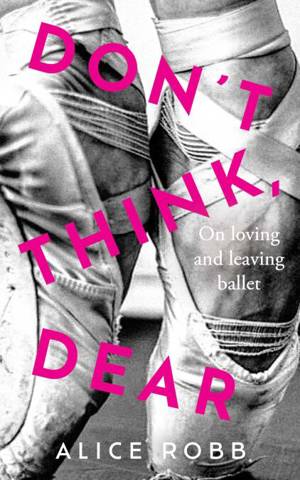
- Retrait gratuit dans votre magasin Club
- 7.000.000 titres dans notre catalogue
- Payer en toute sécurité
- Toujours un magasin près de chez vous
- Retrait gratuit dans votre magasin Club
- 7.000.0000 titres dans notre catalogue
- Payer en toute sécurité
- Toujours un magasin près de chez vous
12,29 €
+ 12 points
Format
Description
Can ballet ever be reconciled with feminist ideals?
'Beautiful, difficult, and compelling.' VANITY FAIR
'Don’t think, dear,' said Balanchine. 'Just do.'
For centuries, being a ballerina has been synonymous with being beautiful, thin, obedient and feminine. It is the crucible of womanhood, together with the harassment, physical abuse and eating disorders endemic at top schools. Can we abide this in a post #MeToo world?
Weaving together her own time at America’s most elite ballet school with the lives of renowned ballerinas throughout history, Alice Robb interrogates what it means to perform ballet today. She confronts the all-consuming nature of the form: the obsessive and dangerous practices to perfect the body, the embrace of submission and the idealisation of suffering.
Yet ballet also gifts its dancers ‘brains in their toes’, a way to fully inhabit their bodies and a sanctuary of control away from the pressures of the outside world. Perhaps it is time to reimagine its liberating potential.
***
'Part memoir, part journalistic investigation, the book weaves [Robb’s] early experiences as a dancer with those of her contemporaries, and of famous ballerinas… Don’t Think, Dear is powered by a fundamental love of the art form while exposing the toxic culture that runs through it.' GUARDIAN
'[Robb’s] timely book is a critical yet personal examination of classical ballet – a performing art highly dependent on the talent of women – filtered through the lens of 21st-century feminism… she brings a welcome academic rigour to a subject clearly born of deeply held emotions.' THE TIMES
'A study of an obsession remarkable for its nuance and insight… It might be easy… to assume that Don’t Think, Dear is Robb’s litany of grievances about a demanding art form in which she failed to flourish. Rather, it is a book about love, even if that love is ultimately unrequited… fascinating.' TLS
'Beautiful, difficult, and compelling.' VANITY FAIR
'Don’t think, dear,' said Balanchine. 'Just do.'
For centuries, being a ballerina has been synonymous with being beautiful, thin, obedient and feminine. It is the crucible of womanhood, together with the harassment, physical abuse and eating disorders endemic at top schools. Can we abide this in a post #MeToo world?
Weaving together her own time at America’s most elite ballet school with the lives of renowned ballerinas throughout history, Alice Robb interrogates what it means to perform ballet today. She confronts the all-consuming nature of the form: the obsessive and dangerous practices to perfect the body, the embrace of submission and the idealisation of suffering.
Yet ballet also gifts its dancers ‘brains in their toes’, a way to fully inhabit their bodies and a sanctuary of control away from the pressures of the outside world. Perhaps it is time to reimagine its liberating potential.
***
'Part memoir, part journalistic investigation, the book weaves [Robb’s] early experiences as a dancer with those of her contemporaries, and of famous ballerinas… Don’t Think, Dear is powered by a fundamental love of the art form while exposing the toxic culture that runs through it.' GUARDIAN
'[Robb’s] timely book is a critical yet personal examination of classical ballet – a performing art highly dependent on the talent of women – filtered through the lens of 21st-century feminism… she brings a welcome academic rigour to a subject clearly born of deeply held emotions.' THE TIMES
'A study of an obsession remarkable for its nuance and insight… It might be easy… to assume that Don’t Think, Dear is Robb’s litany of grievances about a demanding art form in which she failed to flourish. Rather, it is a book about love, even if that love is ultimately unrequited… fascinating.' TLS
Spécifications
Parties prenantes
- Auteur(s) :
- Editeur:
Contenu
- Nombre de pages :
- 320
- Langue:
- Anglais
Caractéristiques
- EAN:
- 9780861542352
- Date de parution :
- 01-03-23
- Format:
- Ebook
- Protection digitale:
- Adobe DRM
- Format numérique:
- ePub

Les avis
Nous publions uniquement les avis qui respectent les conditions requises. Consultez nos conditions pour les avis.






